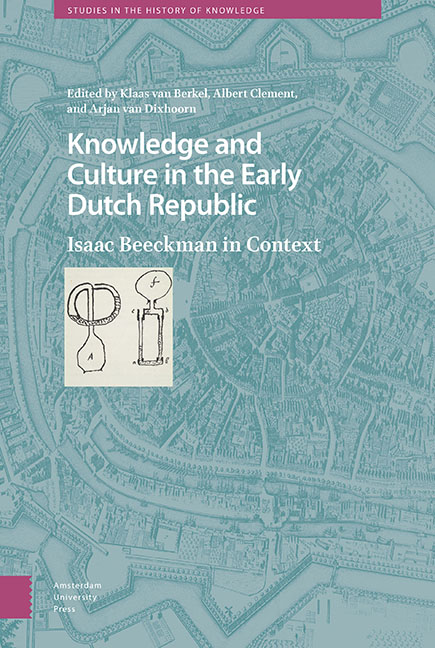1 - Introduction
Published online by Cambridge University Press: 07 October 2022
Summary
In 1905, the discovery of the so-called Journal of Isaac Beeckman was a major event in the small community of historians of science in Europe. The manuscript not only contained precious information about Beeckman's meeting with René Descartes in 1618 and their collaboration in deriving the law of falling bodies, but also copies of some unknown letters by Descartes to Beeckman, and an abundance of notes concerning various topics that were of interest to historians of the early modern period, such as the invention of the telescope, the principle of the conservation of movement, the refraction of light, the concept of air pressure and the corpuscular theory of matter in general. Although Beeckman had not been completely unknown before, from this point on his name became firmly entrenched in the grand narrative of what was soon to be called the Scientific Revolution of the seventeenth century. In his famous book The Origins of Modern Science, 1300-1800 (first published in 1949), Herbert Butterfield refers to Beeckman as ‘a man who stimulated others to take an interest in important problems and initiated a number of ideas’, though without specifying what these ideas were. In The Mechanization of the World Picture (English translation 1961), E.J. Dijksterhuis devoted no less than five pages to Beeckman's work, focusing on his work, with Descartes, on the law of free-falling bodies. In the same vein, John Henry in his slim volume The Scientific Revolution and the Origins of Modern Science (second edition, 2002) pointed to Beeckman in the context of the mathematization of natural philosophy. Isaac Beeckman, he says, ‘set an impressive example of how to use mathematics in physics’. In his more recent The Invention of Science: A New History of the Scientific Revolution (2015), David Wooton also mentions Beeckman regularly.
Nonetheless, even though it would be incorrect to say that Beeckman has been neglected since his notebook was discovered more than a century ago, it is true that to this day the enormous richness of the Journal has not been fully exploited. Like Butterfield, Dijksterhuis only hints at the wealth of interesting topics discussed in Beeckman's notes by saying that although he did not publish his findings, Beeckman's ideas in his Journal are to be valued because they give the reader ‘some notion of the scientific thought of a gifted man of the early seventeenth century’.
- Type
- Chapter
- Information
- Knowledge and Culture in the Early Dutch RepublicIsaac Beeckman in Context, pp. 15 - 28Publisher: Amsterdam University PressPrint publication year: 2022

